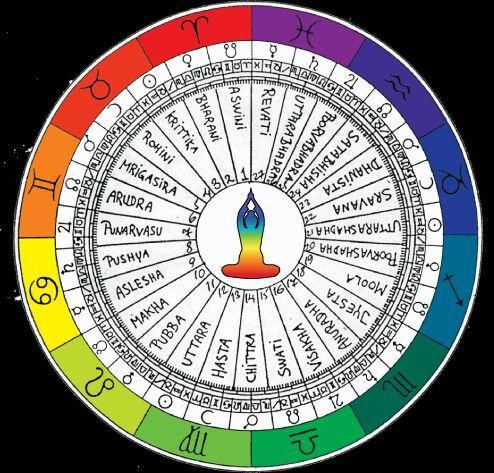 LN writes: “My friends are getting into Vedic Astrology. They claim it’s more accurate than Western Astrology. Is that true?”
LN writes: “My friends are getting into Vedic Astrology. They claim it’s more accurate than Western Astrology. Is that true?”While Vedic astrology does recognize shifts in the earth's ecliptic path which are ignored in the Western version, it has its own fundamental flaws that put it at odds with science. And without the science behind it, the assumptions they make about the influence of the cosmos upon a person’s personality/future, is nothing more than conjecture.
For those who never heard of it, the Hindu America Foundation describes Hindu astrology, originally known as jyotish, or “the science of light,” is based in the same belief as Western astrology, that the stars and planets influence our lives, but the Hindu version takes it a step further. They assert that their form of astrology is more focused on spiritual growth which they believe is facilitated, at least in part, by a person’s karma. (Karma is the concept that every thought and action has a corresponding reaction.)
“The Vedas say that a person’s karma is directly related to the position of the planets and stars, and thus astrology is the method of understanding one’s karma by analyzing these positions,” the site states. “Vedic astrology is considered by many to be the eye of the Vedas, because it is meant to provide guidance to individuals who feel lost or confused on their life’s journey.”
They go on to explain that the primary difference between Vedic and Western astrologers is how the two view constellations.
“Looking up from Earth, the sun and planets trace a path along the sky, moving against a backdrop of constellations, or patterns of stars which make up the various astrological signs, like Taurus, Aries, Pisces, etc. When the sun or a particular planet moves in front of a particular pattern of stars, it is said to be in the astrological sign those stars represent. Thus, the ecliptic path the planets take as they pass in front of the twelve signs of astrology is called the zodiac.”
The zodiac signs used by the West were established according to the ecliptic path that was in existence about 2,000 years ago, a path which has since shifted.
“The ecliptic plane has shifted enough in the last 2,000 years that the position of the sun and planets in relation to the signs no longer matches that of the old ecliptic plane,” the site explains. “Vedic astrology takes precession into account and therefore calculates horoscopes based on the updated ecliptic path. Western astrology, however, sticks to the old path, which is more symbolic as opposed to astronomically accurate.”
This explains why the zodiac signs according to Vedic astrology are different than those used in the West. This site lists the signs, along with their Hindu names, in the following order:
• Aries: Mesha (April 13–May 14) • Taurus: Vrishaba (May 15–June 14) • Gemini: Mithuna (June 15–July 14) • Cancer: Karkata (July 15–August 14) • Leo: Simha (August 15–September 15) • Virgo: Kanya (September 16–October 15) • Libra: Tula (October 16–November 14) • Scorpio: Vrishchika (November 15–December 14) • Sagittarius: Dhanus (December 15–January 13) • Capricorn: Makara (January 14–February 11) • Aquarius: Kumbha (February 12–March 12) • Pisces: Meena (March 13–April 12)
The problem with both forms of astrology is an unscientific view of the cosmos.
According to NASA, the Babylonians, who invented astrology over 3,000 years ago, divided the zodiac into 12 equal parts, sort of like cutting a pizza into 12 equal slices. “They picked 12 constellations in the zodiac, one for each of the 12 ‘slices.’ So, as Earth orbits the sun, the sun would appear to pass through each of the 12 parts of the zodiac. Since the Babylonians already had a 12-month calendar (based on the phases of the moon), each month got a slice of the zodiac all to itself.”
It might sound tidy, but the fact is there are actually 13 constellations, not 12 – and the Babylonians knew this!
“So they picked one, Ophiuchus, to leave out. Even then, some of the chosen 12 didn’t fit neatly into their assigned slice of the pie and crossed over into the next one.”
This is only one of several explanations for why astrology, whether it be Hindu or Western, is not to be relied upon to discern the path of one’s future.
Another good reason for Christians to avoid Vedic astrology in particular is that it's ultimate goal is to help a person achieve moksha, which is freedom from the cycle of birth and rebirth known as reincarnation, a non-Christian belief, this is obviously not a goal that any Christian should embrace.
Instead, Christians should take the advice of St. John Paul II who urged the faithful to put their trust in God’s providence rather than in the dubious readings of star-gazers. In a September 6, 1998, Angelus address he said: “If we want to give good direction to our life, we must learn to discern its plan, by reading the mysterious ‘road signs’ God puts in our daily history. For this purpose, neither horoscopes nor fortune telling is useful. What is needed is prayer, which should always accompany a life decision made in conformity with God’s law.”
© All Rights Reserved, Living His Life Abundantly®/Women of Grace® http://www.womenofgrace.com
